CIE Laboratories
The following are the laboratories available to the CIE program in meeting its educational objectives and outcomes:
- Construction Materials Laboratory
- Pavement Design Laboratory
- Engineering Hydraulics Laboratory
- Geotechnical Engineering Laboratory
- Wastewater Engineering Laboratory
- Engineering Surveying Laboratory
- Strength of Materials Laboratory
- Computing Resources Laboratory
- Engineering Drawing Laboratory
- Engineering Workshops
All laboratories are located in one building under name “Civil and Infrastructure Engineering Laboratories Construction” at the university campus. Engineering Drawing laboratory, Engineering Workshops, and the Strength of Materials Laboratory are associated to other departments in the Faculty of Engineering and Technology. Computer laboratory is located at the CIE department building All these laboratories are used extensively for instructional purposes and to provide support for ongoing student projects activities of the Civil and Infrastructure Engineering Program.
These laboratories have been established in 2010, and have equipped with up to date technology. One computer laboratories equipped with 20 computer screens each were established last year for program and students uses.
The following presents a description of laboratory facilities to support the program educational objectives and outcomes.
Construction Materials Laboratory (Supervisor: Eng. Farah L. Alhusseini)
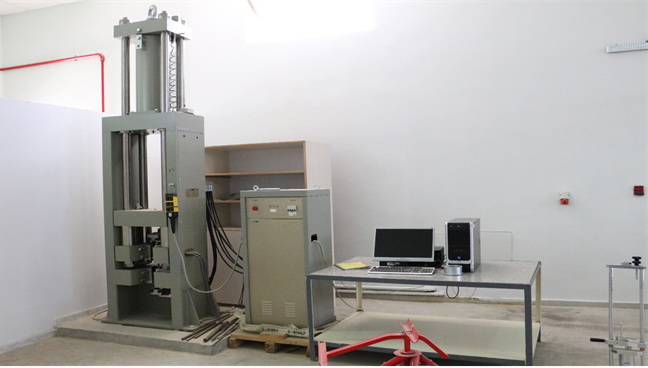
Construction materials equipment is used in Construction Materials Laboratory course (0908223). The laboratory is devoted to the investigation of the constituents and proportioning of concrete and concrete mixtures, the mechanical properties of fresh and hardened concrete and the load and deformation behavior of nearly full-size, reinforced concrete members. The fabrication equipment includes various forms and molds and a bin and batch unit for sand and gravel, a concrete mixer and vibrator.
This laboratory contains a computer controlled universal testing machines, electric vibrating table, standard electronic extensometer, measuring base 50 to 200 mm, 4 machines of coaxial electronic extensometer for round specimens, two gang prism molds to produce cement prisms (expansion of Portland cement), length comparator complete, sieve shaker for sieves up to 450 mm diameter, mechanical strain gauge, compression testing machine, flexure frame, a 100Kn capacity of complete mold for testing standard concrete beams. Besides, the building materials laboratory houses a Los Angeles abrasion machine, Vicamatic, 4 sets of slump cone, stainless steel, shrinkage limit test set, including carrying case, Autoclave weight 108 kg, tilting drum concrete mixer 120/90L, vibro consistometer, large curing tank with circulating pump heater/thermostat unit and lower rack, different sizes of stainless steel sieve, digital balances, oven, length compactor used for measuring length changes, cylindrical and cube molds, riffle box, concrete test hammer, pocket ultrasonic pulse velocity tester, aggregate impact value apparatus, and other equipment and tools essential to conduct the materials testing.
The construction materials laboratory also provided with software providing the data acquisition in real time throughout the test execution up to the specimen failure. All readings are displayed both as graphical and numerical format and stress vs time plot is traced out in real time.
Pavement Design Laboratory (Supervisor: Eng. Mahmoud M. Azzam)
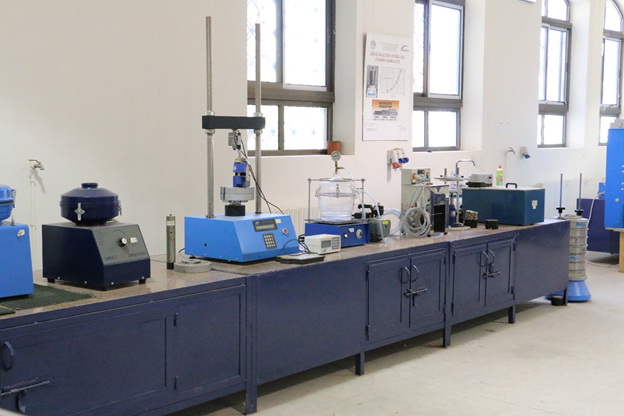
Pavement design equipment is used in Highway and Pavement Design Laboratory course, (0908548). The laboratory is devoted to the investigation of the constituents and proportioning of asphalt and asphalt mixtures. All aspects of testing related to pavement design are giving in this laboratory. All pieces of equipment housed in this laboratory are complete set of Marshall and CBP mechanical 50 kN load frame machine, automatic Marshall compactor, automatic soil compactor, centrifuge extractor, automatic ductilometer, automatic dial penetrometer set, automatic digital ring and ball apparatus, Saybolt viscometer, mobile core drilling machine, large capacity sample splitter 12mm opening, British portable pendulum skid resistance tester, besides other tools to conduct pavements testing, like mold, oven, water bath, sieves, etc.
Hydraulics Laboratory (Supervisors: Eng. Osama MK Ammous)
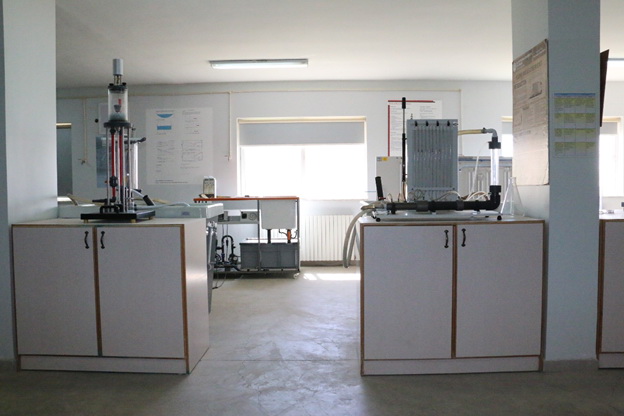
Water and Environment Laboratory course (0908356) is designed to review and practice the concepts of hydraulics and wastewater engineering. In this laboratory, the student will practice the fundamentals of fluid flow by identifying variables and parameters, and performing calculations related to the subject. The student will be taught the procedures and methods for the measurement of flow rates in pipes, orifices and open channel flow, pressures, minor and friction losses in pipes, among others.
The laboratory housed the following major equipment; 2.5-metre flow channel, volumetric hydraulic bench, losses in piping systems, hydrostatics and properties of fluids, permeability tank, flow measurement device, impact of a jet, series/parallel pump test set, Reynold apparatus, besides other tools and apparatus essential for fluid testing.
Geotechnical Engineering Laboratory (Supervisor: Eng. Muawiyah S. Abusallam)
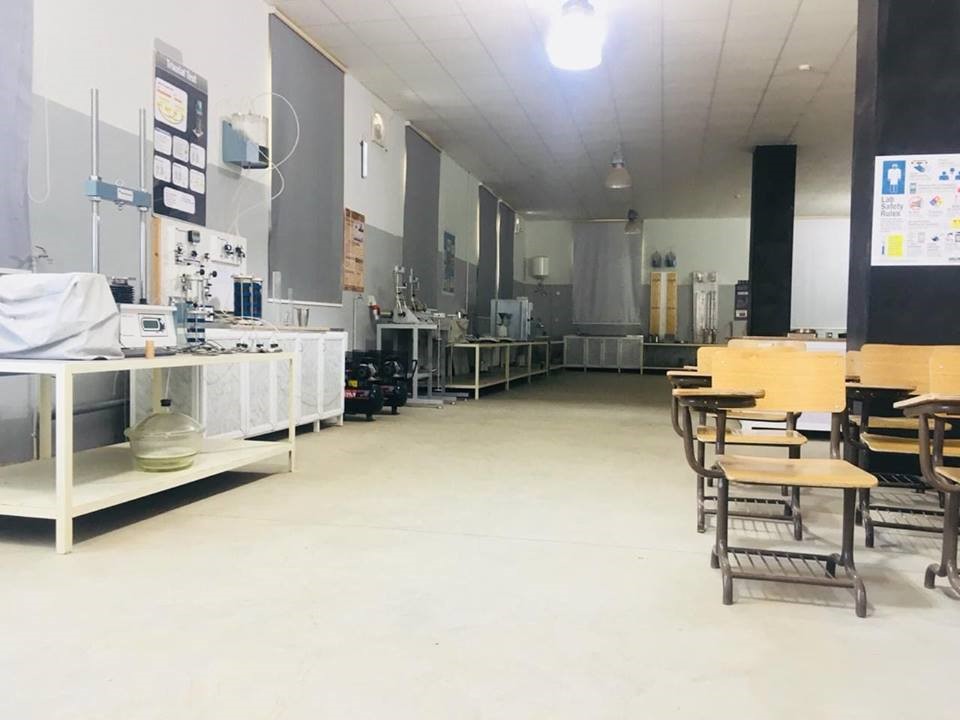
The equipment used in Geotechnical engineering laboratory course (0908362) enable students to conduct all testing of soil, such as Edometer, automatic compactors, electromechanical sieve for sieves up to 315 mm diameter, heavy duty triaxial cells for advanced applications 70 mm, Bladder air/water pressure cylinder, 6.5" sand density cone apparatus, laboratory air compressor, 8 bar max. pressure, triaxial load frame 50 KN, liquid limit device Casagrande method, Riffle boxes, water baths, shearmatic, digital automatic direct/residual shear machine with programmable pneumatic loading, MS Excel Effective Stress (CU-CD) triaxial testing geo-analysis template conforming to ASTM D4767 software, thermostatic ovens, besides other tools like molds, sieves, etc.
Wastewater Engineering Laboratory (Supervisor: Eng. Ahmad Faisal Alkhdarat)
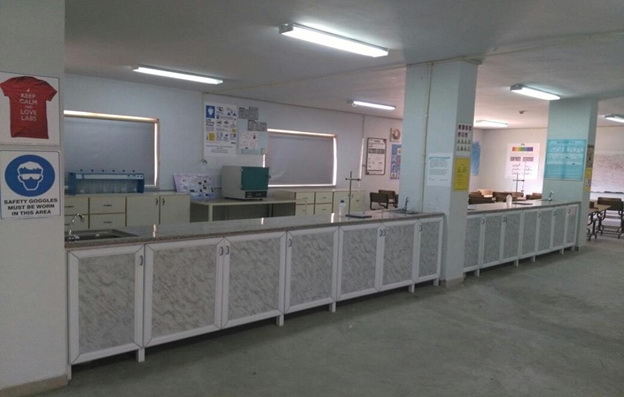
Wastewater engineering laboratory is used for Water and Environment Laboratory course (0908356). This is intended to practice basic water quality analyses. Gravimetric, volumetric and spectrophotometric analytical methods are used to determine quality parameters of raw water, finished water and wastewater. Parameters tested include pH, acidity, alkalinity, hardness, conductivity, salinity and solids, BOD, DO, and COD among others. The laboratory housed the following equipment; pH Meters, portable dissolved oxygen meter, chloride field test system, universal mount for shakers, turbidimeter for turbidity testing, flocculator or jar test, thermostatically controlled incubators, UV/VIS Scanning Spectrophotometer and other tools for wastewater testing like flasks, oven, measuring beaker, etc.
Engineering Surveying Laboratory (Supervisor: Eng. Mohammad A. Alaraj)
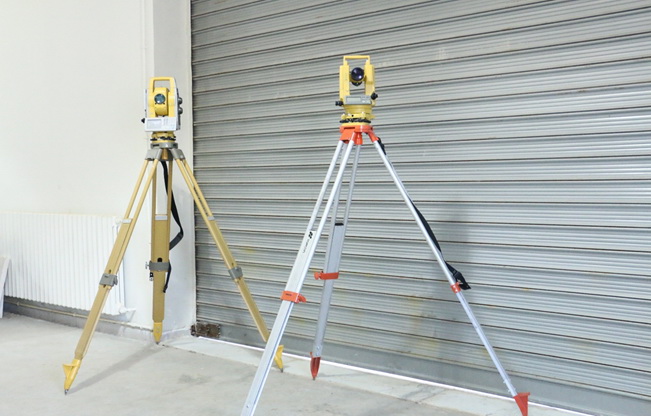
This laboratory has a surveying equipment room. Surveying equipment is used in (0908342) Surveying Laboratory. This laboratory equipped with modern instruments, with sufficient number of instruments for students uses. The major equipment are Total Station, Topcon auto level AT- G2, Electronic Digital Levels DL-500, Digital theodolite Topcon DT-200, Laser theodolite Topcon DT-200, Mirror stereoscope Topcon, Digital Planimeter Placom Topcon KP-90N, along with small tools like measuring tapes, etc.
Strength of Material Laboratory (Eng. Osama MK Ammous and Eng. Ahmad Faisal Alkhdarat)
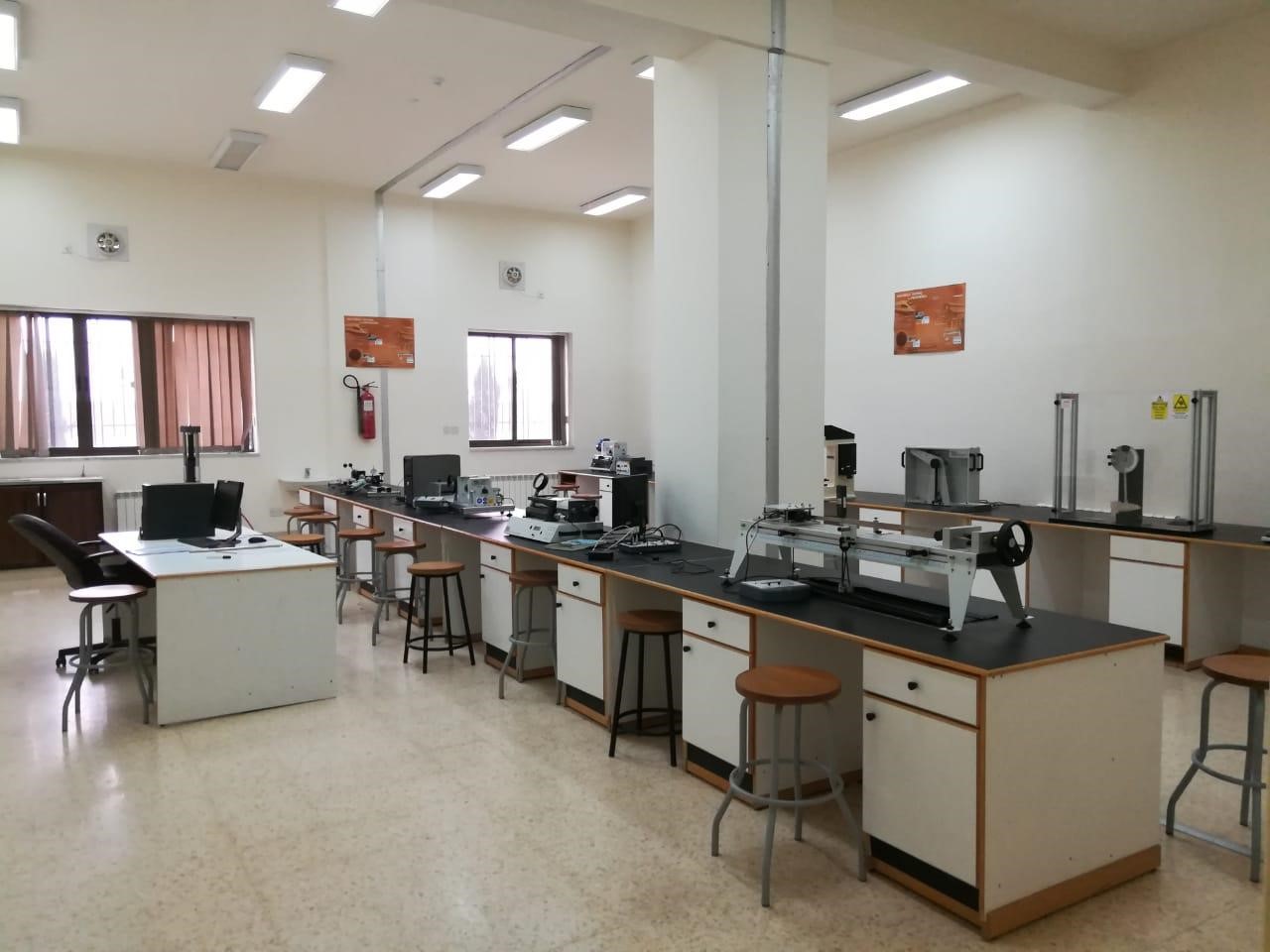
Strength of Material equipment is used in Strength of Material Laboratory course (0908204). The laboratory is mainly devoted to measuring and/or determination of some material properties such as strain and stress, yield stress, ultimate stress and fracture stress. Nondestructive testing (NDT) of materials, micro and macro examination of materials and phase diagrams for steel are also covered in this laboratory. The laboratory is equipped with machines for conducting many other tests, such as tension, impact fatigue, bending, creep, hardness, and photoelasticity test.
Computing Resources Laboratory (Supervisors: All Laboratory Supervisors)
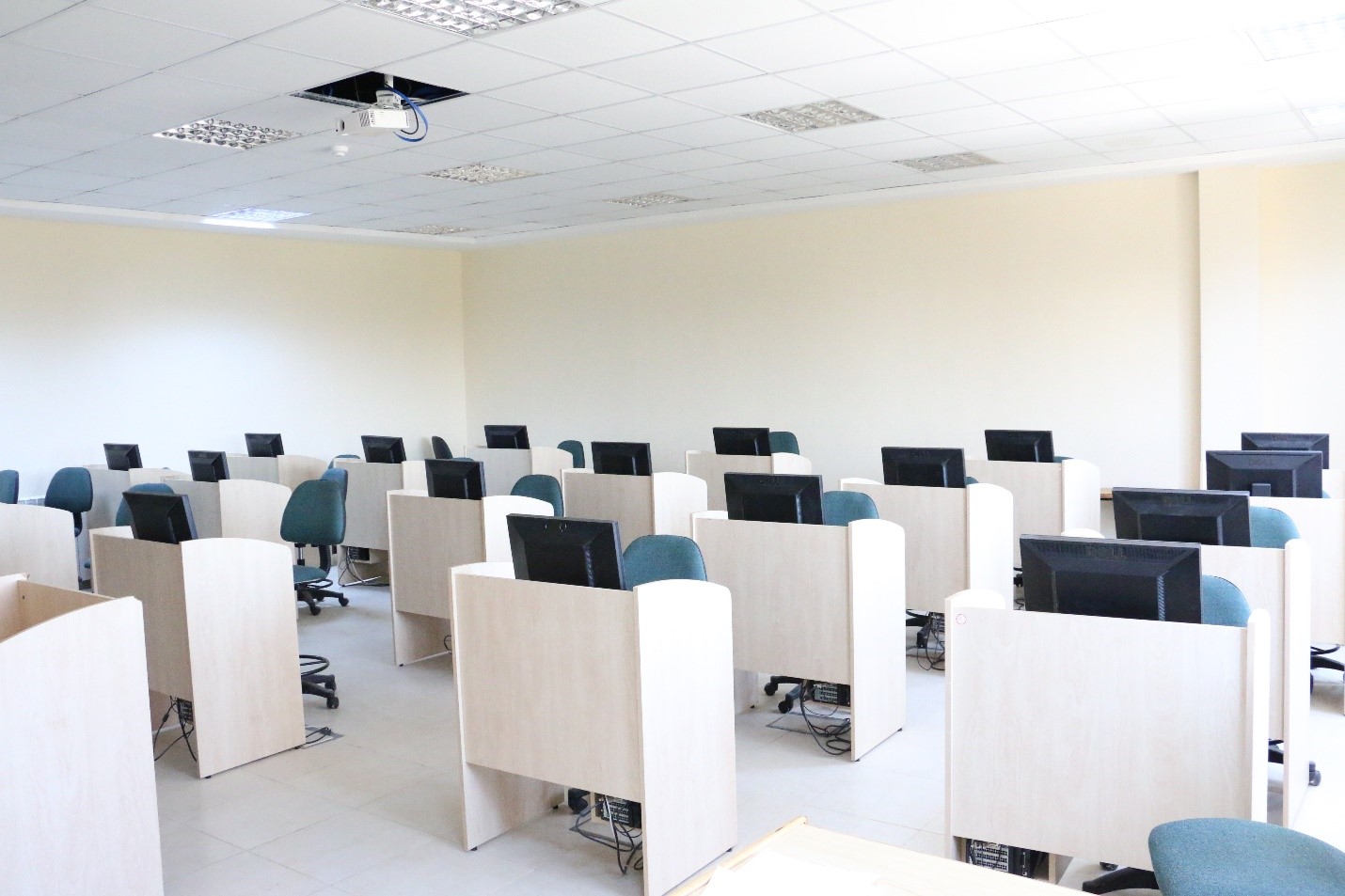
The faculty has two computer laboratory, each Laboratory has 20 workstations. The university computer center maintains site licenses on a variety of software to support the program educational objectives and students outcomes, and the computers change every three years according to the department adopted strategy.
Software most frequently used by undergraduate students are:
- AutoCAD 2018
- PTV Vissim
- Prokon
- MicroPaver
- WaterCAD
- Highway Capacity
Software required for use in the CIE program courses has been adequate, however, new software will be added to support the student’s outcomes and faculty member’s researches. The computer laboratory open daily 9.00 am to 3.00 pm.
Individual faculty members are each provided with a desk-top and/or laptop computer. The Faculty member computers were change every five years. Requests for upgrading and/or purchase of computers and software for faculty are processed through university computer center office and the supplies department. The computer center office is responsible for maintaining and upgrading facilities, each year the computer center office upgrades all computers in the computer laboratory as a regular refresh cycle.
Engineering Drawing Laboratory (Supervisor: Eng. Huda H. Bazzari and Dua’a F. Khamis)
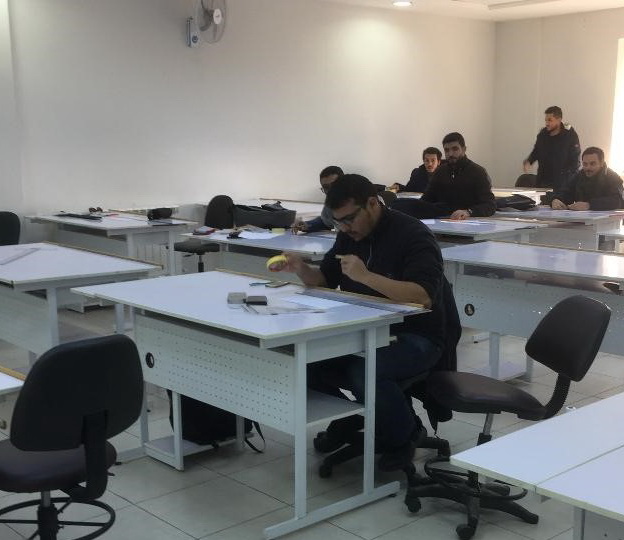
Students at engineering drawing laboratory utilize desktop computers and drawing boards to learn the necessary techniques of preparing engineering drawings, reading and interpreting a drawing, and solving three dimensional engineering problems that require the application of graphical analysis using computer aided design (AutoCAD) and modeling. Students will develop significant depth of understanding and skill in using such platform. This skill are the core CAD skills needed for employment in a CAD related business, such as in engineering design. Students will also learn the basic concept of orthographic projection, projection of points, lines, planes, solids, section of solids, and development of surfaces of solids and isometric projections.in 2 and 3 dimensions.
Engineering Workshops (Technician: Abdullah Albashayreh, Tariq Al Joulani, Ihsan Nawfal, and Muhammed Al Timimi)
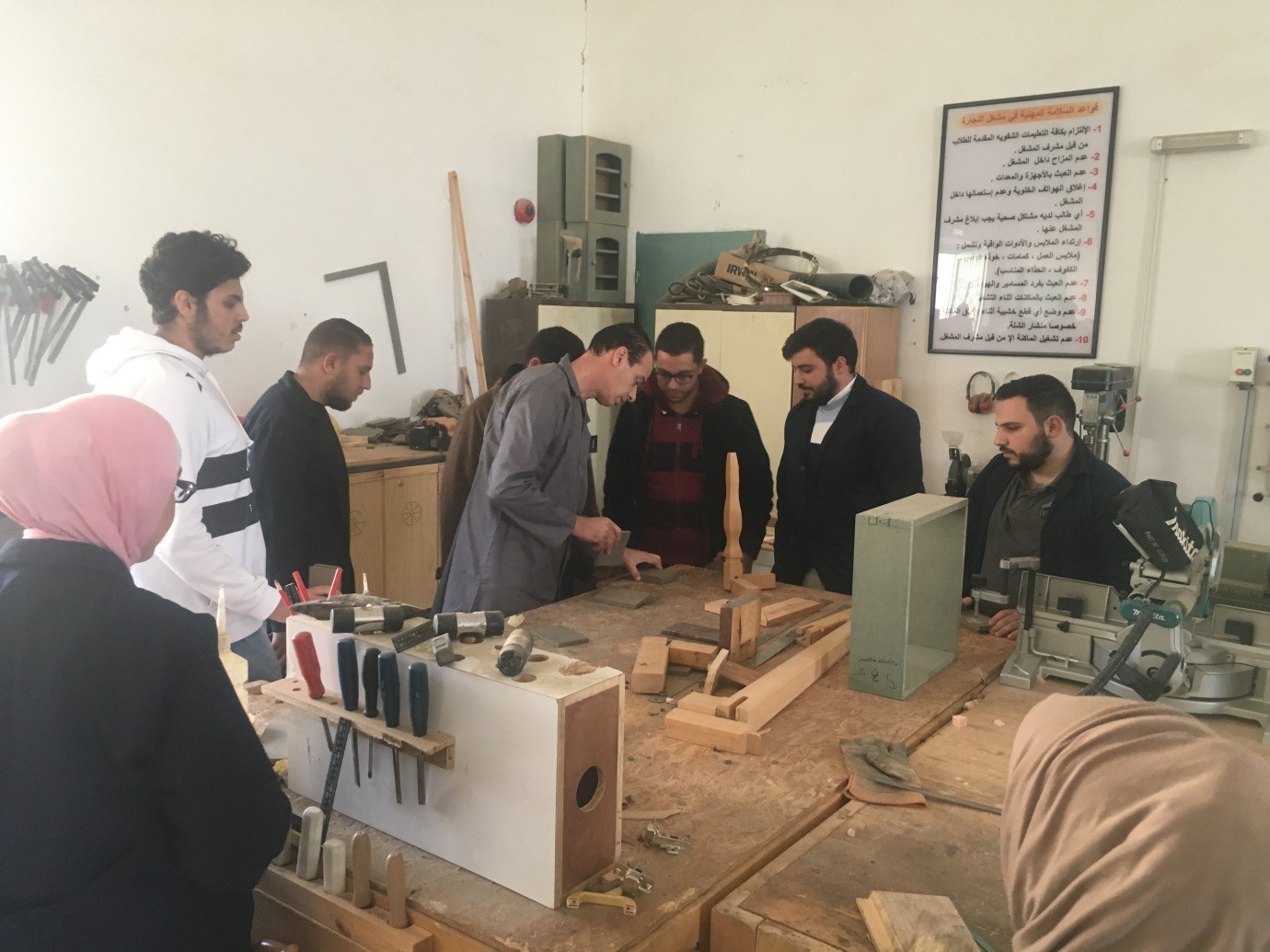
Engineering Workshops are meant to aid in the education plans for the different departments including CIE one at the Faculty of Engineering and Technology. The workshops are well equipped with modern equipment and capable of producing precise dimensions in different materials such as metal, wood, glass, or plastic. Engineering workshops cover carpentry, welding, electrical installations, model making through milling and lathe, CNC lathe.
